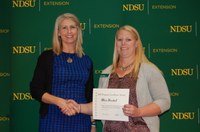NDSU Extension Teams Honored for Program Excellence
(Click the image below to view a high-resolution image that can be downloaded)
Note: Additional photos are available at http://bit.ly/2018ProExcellenceAwards
Four North Dakota State University Extension teams have been honored for their work with a Program Excellence Award.
The teams received their awards during the joint NDSU Extension and Research Extension Center conference Oct. 22-25 in Bismarck, N.D. The honors included cash awards sponsored by Farm and Ranch Guide.
Healthwise for Guys
According to Centers for Disease Control and Prevention statistics, North Dakota men have a higher rate of skin, colon and prostate cancer than the national average. Healthwise for Guys is NDSU Extension’s first men-specific health program. The program includes a website, fact sheets, displays, presentations and men's health toolkits. In the first six months of the program, nearly 800 men aged 18 and older participated. In the colon and prostate cancer programs, 95 percent indicated their lifestyle had room for improvement, and 96 percent would recommend the program to others. Team members: Julie Garden-Robinson, Kristi Berdal, Cindy Klapperich, Ellen Crawford, Bob Bertsch, David Haasser
North Dakota Soil and Watershed Leadership Academy
North Dakota Soil Conservation districts struggle to fill board positions with qualified board members, and existing board members indicate they want to become more effective. NDSU Extension partnered with the North Dakota Department of Health’s Water Quality Division to develop the academy to increase the capacity of North Dakota’s soil conservation and watershed leaders to lead watershed and community-based projects that will protect water quality for future generations.
Eighty-four percent of the academy’s participants reported they feel more confident in using parliamentary procedures, 86 percent feel comfortable making a motion in a meeting and 87 percent know how to access and comply with open meeting laws. Team members: Bruce Schmidt, Andrea Bowman, Marie Hvidsten, Katelyn Hain, Jodi Bruns, Jim Collins, North Dakota Department of Health - Division of Water Quality
On the Move to Better Health Kids Cooking School
The On the Move Cooking School curriculum consists of eight hands-on lessons that can be delivered in camp settings or after-school programs, or as weekly lessons. Each lesson has its own objectives, key concepts, physical activities, worksheets, associated recipes, a parent newsletter and evaluation tools. Lesson topics include measuring recipe ingredients, reading recipes, identifying and using kitchen equipment, safe food handling, reading nutrition labels, meal planning, and hands-on cooking and baking.
Nearly 975 children from 18 counties have participated in the program. In a three-month follow-up survey, parent reported that 83 percent of children were independently preparing food at home. Team members: Julie Garden-Robinson, Mary Jean Hunter, Molly Soeby, MaKayla Heinz, Carrie Knutson, Linda Kuster, Karen Armstrong, Vicky Arvidson, Sara Laite, Lu Morehouse, Donna Anderson, Jamie Medbery, Michelle Effertz, Mariam Said, Nicole Smith, Dena Kemmet, Cindy Klapperich, Deb Lee, Vanessa Hoines, Trisha Jessen, Kimberly Fox, Deb Johnson, Macine Lukach, Kayla Carlson, Ronda Gripentrog, Susan Milender, Rita Ussatis
Palmer Amaranth Weed Watch: From Bus Tour to Raising Awareness in North Dakota
Palmer amaranth is a very aggressive, hard-to-control weed. Early identification is vital to reduce economic losses in North Dakota. NDSU Extension specialists and agents traveled to Nebraska to learn about Palmer amaranth identification and management from University of Nebraska - Lincoln Extension staff, local agronomists and farmers. This team then developed teaching material, and a train-the-trainer workshop for NDSU Extension staff was held in January 2018. During the 2017-18 meeting season, Extension specialists and agents raised awareness of Palmer amaranth’s potential economic impact to North Dakota and how to identify the weed. Following those presentations, 95 percent of the participants reported they were aware of how competitive and adaptive Palmer amaranth is, compared with 46 percent prior to the educational sessions.
Team members: Tom Peters, Alicia Harstad, Bill Hodous, Craig Askim, Tim Becker, Lindy Berg, Brad Brummond, Paige Brummund, Anitha Chirumamilla, Calla Edwards, Kelsie Egeland, Greg Endres, Sheldon Gerhardt, Randy Grueneich, Katelyn Hain, Sam Haugen, Brian Jenks, Angie Johnson, Clair Keene, Breana Kiser, Scott Knoke, Samantha Lahman, Chandra Langseth, Joel Lemer, Lindsay Maddock, Duaine Marxen, Cindy Olson, Julianne Racine, Crystal Schaunaman, Alyssa Scheve, Rick Schmidt, Yolanda Schmidt, Melissa Seykora, Rachel Wald, Nicole Wardner, Katie Wirt, Brian Zimprich, North Dakota Soybean Council, Ted Alme (Natural Resources Conservation Service), Carah Hart (Red River Farm Network), Dale Hildebrandt (Farm and Ranch Guide), Jonathan Knutson (AgWeek), Roberto Luciano (Natural Resources Conservation Service), Chelsey Penuel (North Dakota Department of Agriculture), Greg Kruger (University of Nebraska-Lincoln Extension), Jody Saathoff (CHS, Minden, Neb.)
Jana Berentson, Farm and Ranch Guide, presented the awards.
NDSU Agriculture Communication - Oct. 30, 2018
| Editor: | Ellen Crawford, 701-231-5391, ellen.crawford@ndsu.edu |
|---|


